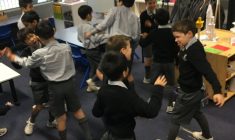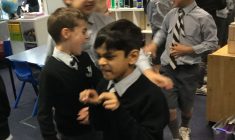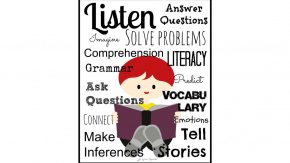Stage 1 – Drama
Play is a natural part of children’s lives as it helps them to make sense of their place in the world. Such creativity can be harnessed through drama to enable active and interactive learning experiences, especially when paired with quality children’s literature.
Our stage one students have entered into a literacy unit which will be focusing on how language ignites our imagination through its ability to evoke sensory images and convey meaning. We will be using the drama process to enhance the development of literacy in our classroom. Speaking and listening skills can be developed through role play and improvisation, but drama also provides the context to improve writing skills. Improvisation and storytelling develop children’s understanding of narrative structure, whilst playing in-role, creating soundscapes and moving through space supports the development of descriptive writing.
Learning through drama is not about a performance, its value comes through the process of playing. Effective drama strategies we use in the classroom to engage with literature include:
Freeze Frames
Freeze frames are used in drama to make a visual picture, like a photograph, to show characters in a scene or series of scenes. The freeze is held for several seconds to clearly show through the actions and facial expression what the characters are feeling and how they are feeling about other characters in the scene.
Soundscapes
This strategy works best in large groups and involves the group using their voices, bodies and other materials to create a sound collage. It’s especially good for creating environments and atmosphere, and supports the boys to understand the sounds they can describe in their writing.
Sculpting
In pairs, one person (A) is the sculptor and the other (B) is the block of clay. This strategy requires the boys to slowly and carefully attend to different aspects of the ‘clays’ expression. It builds their awareness of the breadth of expression they can describe in their writing.
Embodiment
This requires the boys to physically and verbally embody a character from story, they may move like them or speak alike. Ultimately it is a strategy that develops boys understanding of a character beyond the words of the text and into the realm of inference, as their embodiment of the character extends past the book and they are required to act and answer as if they were that character in new situations.
Drama in a literacy context can provide children with a meaningful purpose for writing. Our boys become motivated to communicate their imagination when writing after being supported to develop their ideas and language through dramatic play.
Carol Peterson – Year 2 Teacher









